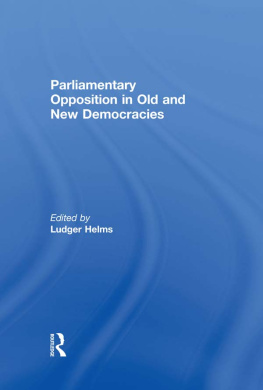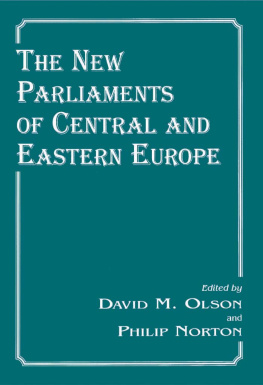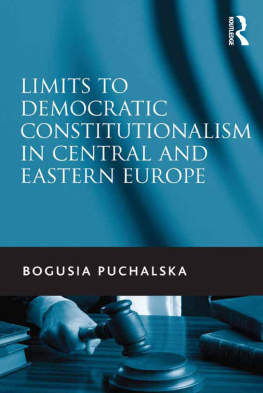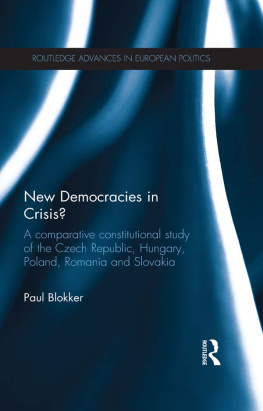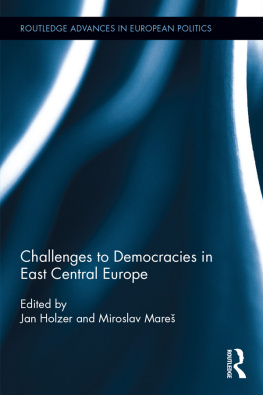THE ECONOMY AND POLITICAL CULTURE IN NEW DEMOCRACIES
To Jane and John Broderick
The Economy and Political Culture in New Democracies
An analysis of democratic support in Central and Eastern Europe
Kristin J. Broderick
Kutztown University, USA
First published 2000 by Ashgate Publishing
Reissued 2018 by Routledge
2 Park Square, Milton Park, Abingdon, Oxon OX14 4RN
711 Third Avenue, New York, NY 10017, USA
Routledge is an imprint of the Taylor & Francis Group, an informa business
Copyright Kristin J. Broderick 2000
All rights reserved. No part of this book may be reprinted or reproduced or utilised in any form or by any electronic, mechanical, or other means, now known or hereafter invented, including photocopying and recording, or in any information storage or retrieval system, without permission in writing from the publishers.
Notice:
Product or corporate names may be trademarks or registered trademarks, and are used only for identification and explanation without intent to infringe.
Publisher's Note
The publisher has gone to great lengths to ensure the quality of this reprint but points out that some imperfections in the original copies may be apparent.
Disclaimer
The publisher has made every effort to trace copyright holders and welcomes correspondence from those they have been unable to contact.
A Library of Congress record exists under LC control number: 00134487
ISBN 13: 978-1-138-73814-0 (hbk)
ISBN 13: 978-1-315-18503-3 (ebk)
I owe thanks to many friends and colleagues who have unselfishly given their time and energy toward this project. Foremost, I am grateful to Thomas C. Muller for his analytical, editorial, and technical assistance. Special thanks to Noreen Boyle-Tunney, Elaine Tallman, and Lori Ann Vandermark for production help. I would also like to thank Sam Martineau for assisting with various reference materials and editorial comments.
I am extremely fortunate to have had friendship and professional advice from Richard I. Hofferbert, James P. Young, Eduard Ziegenhagen, and Stuart A. Bremer. And, I am heavily indebted to Robert Compton, Jenny Heyl, Susan Metz, David H. Sacko, and Eric J. Kimmelman for their technical advice, moral support, and friendship.
The collapse of Communism in Central and Eastern Europe poses both theoretical and empirical challenges to social scientists. Beyond the immediate significance of the demise of totalitarianism in the region, the democratic transitions have worldwide implications. For some, the fall of Communism signifies the triumph of liberal democracy and the 'end of history' (Fukuyama, 1992). For others, it represents a movement towards world peace (Maoz and Russett, 1993). Regardless of the ideological connotations of these arguments, it is undeniable that the transitions in Central and Eastern Europe are part of a greater global movement toward democracy. They are the culmination of the 'third wave' of democratization, which constitutes by far the largest expansion of democracy in world history (Huntington, 1991). Accordingly to Doh Chull Shin, the number of democratic regimes has more than doubled since 1972. Today, nearly 60 percent of the countries of the world are democratic.
Corresponding to this global expansion of democracy, a significant amount of research concerning the forces that propel democratization has emerged. The research not only has examined the socio-economic and cultural factors that influence the development of democracy, but also has explored how new democracies can be maintained and consolidated. An understanding of the consolidation process is crucial in view of the frequency of reversal, which has demonstrated the precarious nature of some new democracies. The failure of democratic regimes is often attributed to the lack of necessary conditions for consolidation. Shin asserts that 'empirically, newly democratizing countries tend to lack many factors that facilitate the process of democratization, including market economies and civic organizations' (1994, 137). If social scientists can achieve a greater understanding of the consolidation process, perhaps they can assist the new democracies in surviving in the face of economic, social, and cultural obstacles.
This research investigates the consolidation of the new democracies in Central and Eastern Europe. Unlike many other countries that have experienced transitions towards democracy, the Central and Eastern European states face the additional hurdle of transforming their economies. The rigors of economic transition, coupled with the underdevelopment of civil society and the legacy of a half century of state socialism, pose major impediments to the preservation of democracy in the region. It is still uncertain whether these countries will continue along the path of consolidation or regress into authoritarian regimes (Schmitter, 1994). An examination of the relationship between the economic environment and popular support for democracy can contribute to a better understanding of those factors, which, in turn, could assist the process of democratic consolidation.
The purpose of this research, then, is to examine the effect of economic factors on popular support for democracy in Central and Eastern Europe. It rests, both theoretically and empirically, on the assumption that democracy can survive and consolidate only if the public is committed to it. It may be that the transitions in Central and Eastern Europe were initiated by elites; however, a democratic regime, by definition, can continue only through citizen support, which therefore qualifies as a legitimate focus in examining democratic consolidation. What factors influence citizen commitment to democratic regimes in Central and Eastern Europe? How does economic performance affect support for the regimes? What strategies can policymakers implement to promote the democratization process in this region?
My research also examines the effect of free-market transitions on the consolidation of the newly emerging democracies in Central and Eastern Europe. There is widespread agreement among social scientists that the success of liberal democracy in the Central and Eastern European countries will depend largely upon the success of the mutually reinforcing processes of economic and structural change (Huntington, 1991; Przeworski, 1991). The central question that I explore is: what are the effects of economic policy, economic conditions, and economic perceptions upon citizen support for the new democracies? Specifically, what role does the economy play in the survival of the new democracies? I argue that citizen perception of well-being is the most important element influencing political support.
In addition to economic factors, what other influences affect democratic support? I argue that political culture can hinder or assist democratic consolidation. Although all of these states endured long-term Soviet domination, they exhibit significant differences in their political culture. Thus, previous political experience, political development, and attitudes toward politics play an important role in the consolidation process.
The book is organized into two parts. through Nine) contains four country case studies that investigate the political development of each state and assess how democratic support has been affected by the political culture of the state.




